Key takeaways:
- Marxist theory emphasizes the inherent class struggle between the bourgeoisie and the proletariat, highlighting issues of alienation and commodification in the workforce.
- Capitalism prioritizes profit and competition, leading to significant disparities in wealth and often disregarding ethical concerns and worker well-being.
- Contradictions in capitalism, such as the tension between growth/finite resources and individualism/community, underscore systemic inequalities and challenge the notion of equal opportunity.
- Modern implications of Marxism, seen in activist movements and the commodification of personal data, reflect the ongoing struggle for equity and the need for systemic change in contemporary society.

Understanding Marxist Theory
Marxist theory centers on the idea that capitalism inherently leads to class struggle. This struggle arises from the conflict between the bourgeoisie, who own the means of production, and the proletariat, who sell their labor. Reflecting on my own experiences, I often wonder how many people truly grasp the implications of this divide when they engage in daily work life.
One aspect of Marxism that resonates with me is its critique of commodification—the process where social relationships and human experiences are reduced to mere economic transactions. I remember a time when I felt utterly dehumanized while working in a retail job, seeing customers and coworkers treated as cogs in a machine rather than individuals with stories and aspirations. Have you ever felt like just a number in a system? Those moments made me realize how our personal worth can be overshadowed by market values.
Furthermore, Marx’s concept of alienation deeply speaks to me. He argued that labor under capitalism separates workers from the products of their work, leading to a disconnection not just from their labor but from their own humanity. I recall a discussion with a friend who described her struggles in a job that felt meaningless. It made me ponder: how can we reclaim our sense of purpose in a world that often prioritizes profit over people? Exploring Marxist theory invites us to examine these experiences more closely and encourages a deeper conversation about our roles within the capitalist framework.

Basics of Capitalism Explained
Capitalism, at its core, revolves around private ownership and the production of goods for profit. It emphasizes free markets where supply and demand dictate prices. I often think about how my time in a small startup illustrated these principles. We were competing fiercely for customer attention, which drove innovation but also created pressure that sometimes felt overwhelming. It makes me wonder, how does competition shape our daily lives and influence our choices?
Here are some basics of capitalism to consider:
- Private Property: Individuals or companies can own resources and goods, allowing them to manage production.
- Market Competition: Businesses compete to attract consumers, which can lead to better products but also ethical concerns.
- Profit Motive: The primary goal is to maximize profits, often impacting labor practices and consumer pricing.
- Consumer Choice: A vast array of products and services gives consumers the power to influence the market.
- Uneven Wealth Distribution: This system can lead to significant disparities in wealth and class divisions, raising questions about social equity.
Reflecting on these aspects, I remember visiting a bustling local farmers’ market. The vibrant energy was palpable; it highlighted both the wonderful diversity of products and the stark contrasts in wealth among different vendors. It sparked a realization in me: while capitalism breeds creativity and choice, it also reinforces divisions that impact community and connection.
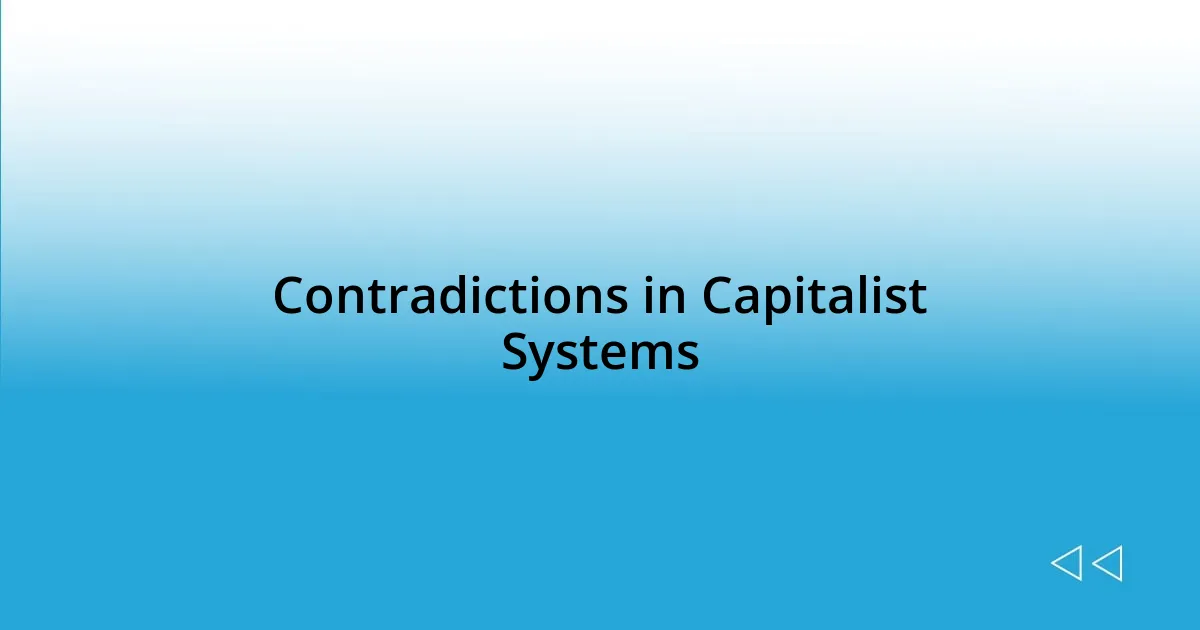
Contradictions in Capitalist Systems
One of the most striking contradictions in capitalist systems is the reliance on continuous growth while facing inevitable resource limitations. I think back to a corporate meeting I attended, where the focus was solely on expanding profits without considering the environmental cost. It left me with a nagging discomfort; how can businesses thrive on a planet with finite resources? This contradiction highlights the potential for unsustainable practices that jeopardize not just future generations but our current quality of life.
Another contradiction emerges from the emphasis on individualism, which paradoxically leads to collective alienation. I recall attending a community event where many expressed feeling isolated despite living in a bustling city. We celebrate individual success in capitalism, but what about those moments when people yearn for connection? This tension prompts a reflection on how our pursuit of personal achievement often comes at the expense of community bonds—a scenario that Marx would likely argue undercuts our shared humanity.
Lastly, the capitalist promise of opportunity and social mobility frequently falls short, perpetuating systemic inequalities. I once met a talented barista who aspired to be an artist, yet her work hours barely covered rent, let alone art supplies. Her story sparked questions within me: How do we reconcile talent with opportunity? It seems that our economic system can create barriers rather than bridges, leaving many to wonder about the fairness of a system designed to uplift all.
| Contradictions in Capitalism | Examples |
|---|---|
| Continuous Growth vs. Finite Resources | Corporate focus on profits disregarding environmental impacts |
| Individualism vs. Social Isolation | Desire for personal achievement leading to community alienation |
| Opportunity vs. Systemic Inequality | Talent not translating into financial stability for everyone |
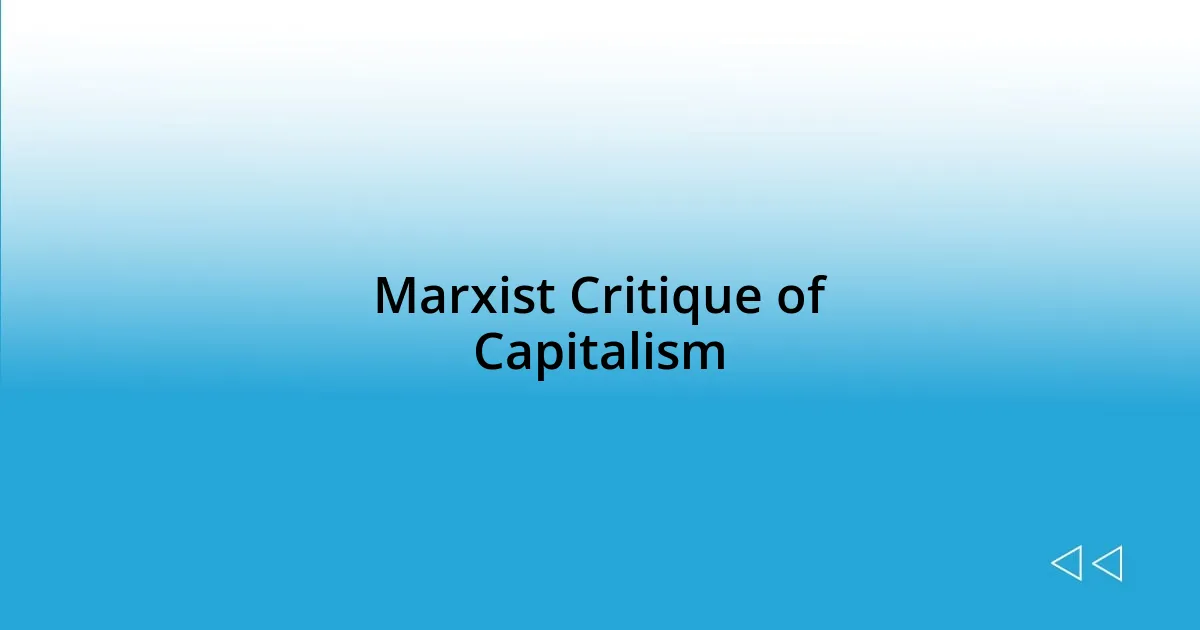
Marxist Critique of Capitalism
The Marxist critique of capitalism fundamentally centers around the concept of exploitation, highlighting how workers often fail to receive a fair share of the value they create. I remember a discussion with a friend who worked long hours in retail for just above minimum wage. It struck me how dedicated she was, yet the profits she helped generate mostly lined the pockets of corporate executives. This left me pondering: how can a system claim to celebrate hard work when so many contribute yet remain barely afloat?
Another critical aspect is the alienation experienced by workers within a capitalist framework. I once had a friend who was a factory worker, laboring day in and day out on a production line. While he was skilled and knowledgeable, he often expressed feeling like just another cog in the machine, with little connection to the end product. It made me wonder, doesn’t our work deserve more meaning than merely fulfilling quotas? This disconnection points to Marx’s assertion that capitalism strips individuals of their human essence.
Furthermore, the perpetual quest for profit generates a cycle of inequality, with wealth concentrating in the hands of a few. I’ve seen this firsthand during community outreach events, where those in need often lacked access to basic services while wealthier individuals seemed completely insulated from economic shifts. It leads me to ask: can genuine progress be achieved in a system that simultaneously upholds such stark divisions? The reality of this disparity challenges the notion of capitalism providing equal opportunity for all, a fundamental claim that I find increasingly difficult to accept.
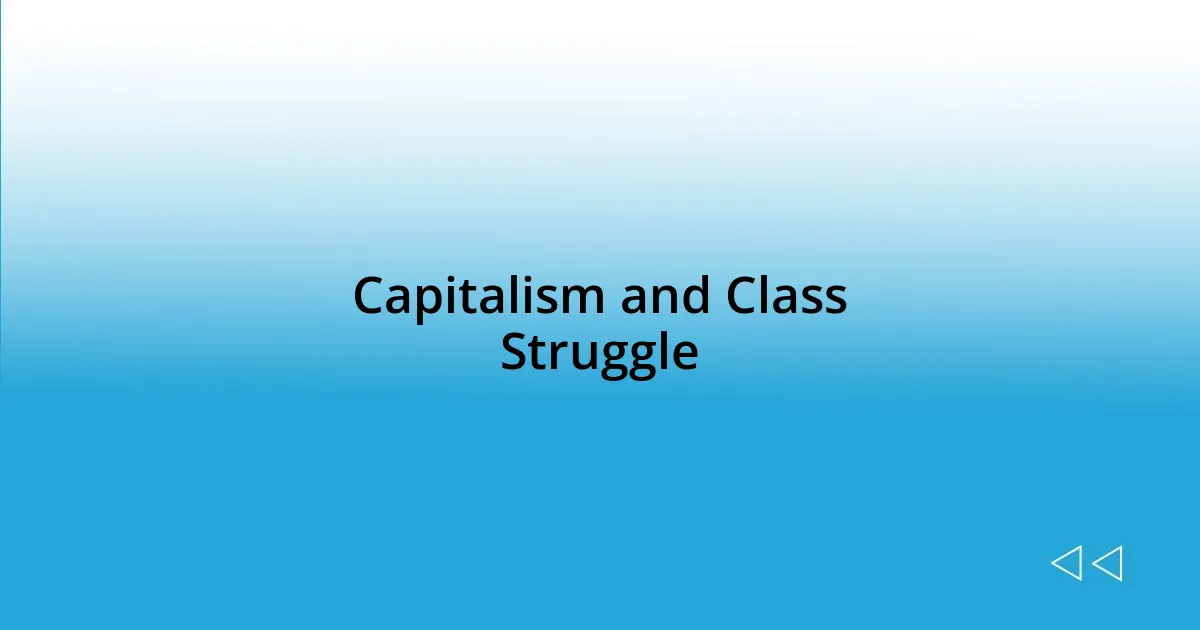
Capitalism and Class Struggle
When I think about capitalism and class struggle, the stark divide between the wealthy and the working class often looms large in my mind. I once volunteered at a local food bank, witnessing firsthand how families are struggling to make ends meet. It struck me how the system often prioritizes profit over the basic needs of individuals—those receiving help were hardworking people who, despite their efforts, found themselves repeatedly pushed to the margins. Doesn’t this reality challenge the idea that hard work is duly rewarded in our society?
The class struggle feels particularly palpable during moments of economic downturn. I recall a time when my friend, a small business owner, faced devastating losses due to a recession. Despite his relentless efforts to salvage his venture, he eventually had to close his doors while larger corporations continued to thrive. This situation stirred up a question for me: how can a system that purports to promote entrepreneurship simultaneously crush the dreams of those who dare to take risks? The contrast between corporate success and individual despair is a powerful testament to the class disparities that capitalism engenders.
I’ve also been struck by the blurring lines between class and identity, especially when I served as a mentor for at-risk youth. Many of these young people carried the weight of socioeconomic barriers that shaped their life choices and opportunities. Listening to their stories made me reflect on Marx’s ideas about how inherent class struggle can dictate one’s destiny. Isn’t it disturbing to think that so much of one’s potential could be stifled by circumstances beyond their control? As I consider these personal narratives, the complexities of class struggle under capitalism become not just an academic discussion but a deeply human struggle that demands attention.
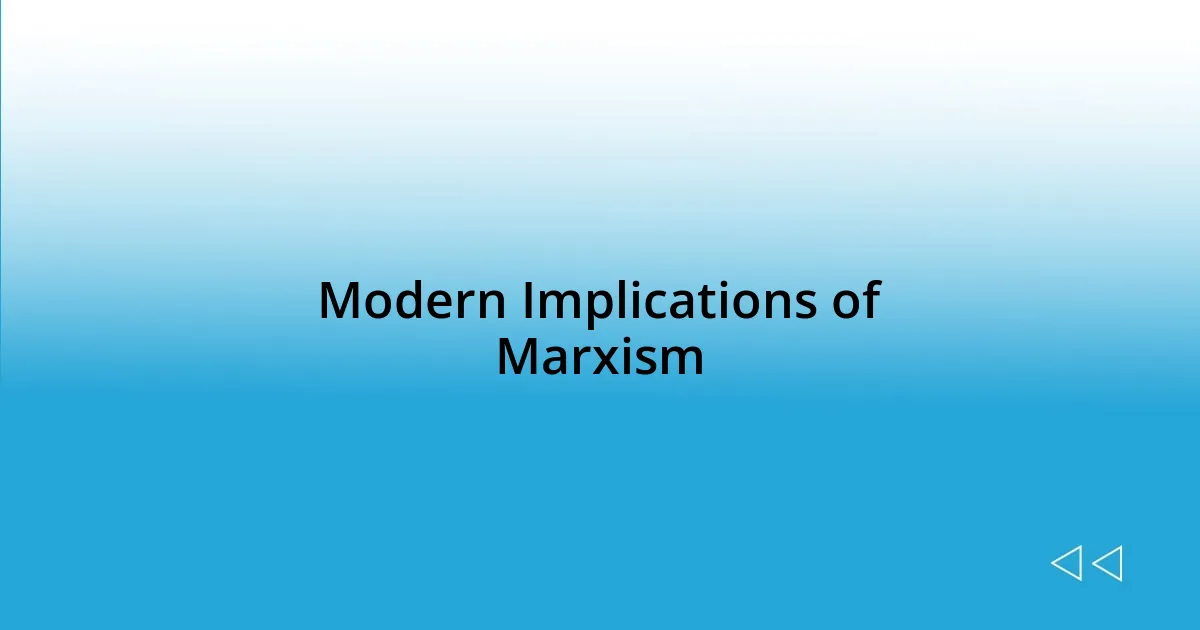
Modern Implications of Marxism
Modern capitalism, intertwined with its Marxist critiques, brings forth implications that resonate deeply in today’s society. While attending a community rally for workers’ rights, I witnessed a diverse group of individuals united by common frustrations over wage disparity. The palpable energy in the air spoke volumes about the struggle for equitable treatment in modern workplaces. Is it possible that the voices of the many can finally drown out the greed of a few?
The concept of commodification also stands out to me as a significant modern implication of Marxism. During a recent discussion with my colleagues about social media platforms, we reflected on how our personal data has become a commodity sold to the highest bidder. This realization made me uneasy; it struck me that our social interactions, experiences, and even our identities now revolve around the pursuit of profit. Are we merely products in a system that thrives on consumerism, stripped of our individuality in the process?
Furthermore, the rise of activist movements is a direct reflection of Marxist ideals manifesting in the present day. Participating in a local environmental protest, I felt a surge of solidarity among people who were fighting for change against corporate negligence. It dawned on me how these movements are akin to the proletariat uprising that Marx envisioned—they seek to reclaim power from those who wield it irresponsibly. Can we redefine progress to include ecological sustainability and community well-being, rather than just financial gain? The evolving narrative surrounding these movements speaks to a collective awakening, challenging the status quo in favor of a more equitable future.
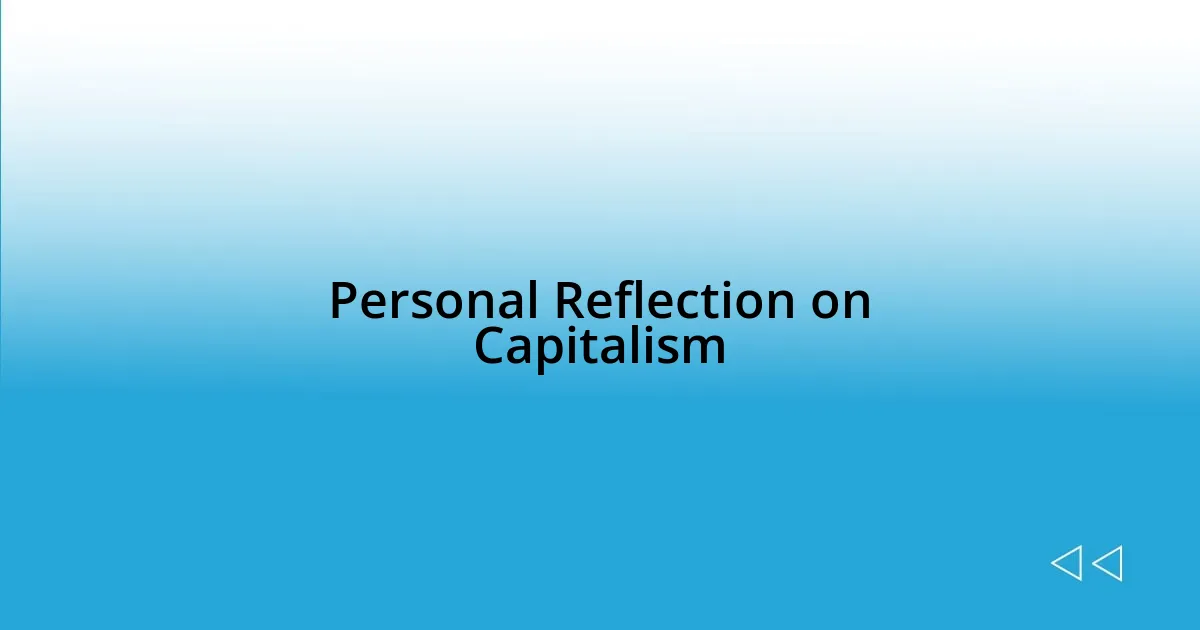
Personal Reflection on Capitalism
When I think about capitalism, I often reflect on its insidious nature. I remember sitting in a café, overhearing a conversation between two friends who were lamenting the high cost of living. They spoke about how even working multiple jobs didn’t provide them with the stability they desired. It made me ponder: how is it that one of the wealthiest nations can’t guarantee basic security for its citizens? The emotional strain they expressed resonated with me, highlighting the uncomfortable truth that many are caught in a relentless cycle of striving and struggling.
Looking back, my experience working in a corporate environment opened my eyes to the underlying tensions in capitalism. I recall an annual meeting where executives celebrated record profits while layoffs loomed over the employees like a dark cloud. It struck me how the human cost was often overshadowed by the bottom line. This stark contrast raised a nagging question in my mind: what happens to the people behind the numbers? Those moments left me feeling a sense of disillusionment, as if the very system we revered was, in many ways, dehumanizing us.
Many of my friends have dedicated their lives to passionately pursuing their careers, yet I’ve seen how easily ambition can be channeled into burnout within a capitalist framework. I recall a close friend who poured everything into her startup, only to sell it at a loss after a couple of years of relentless work. The disappointment was palpable, and it made me wonder: how does capitalism redefine our dreams into mere commodities? This reflection evokes a profound sense of empathy for those who chase success in an ever-competitive world—one shaped more by systemic pressures than by individual merit.
















